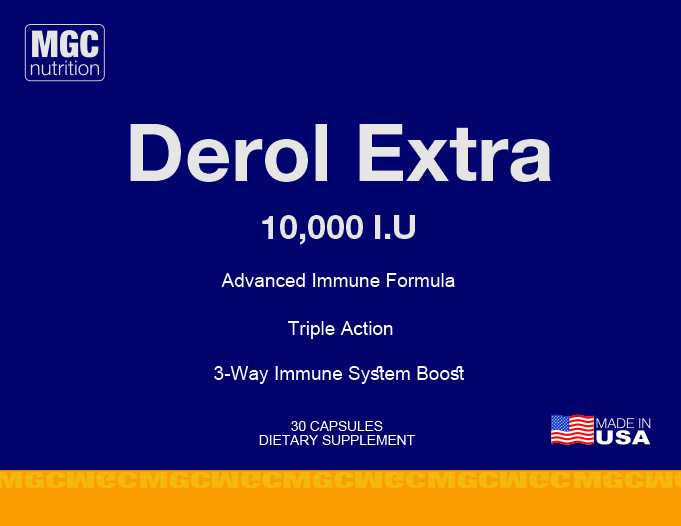Derol Extra 10,000 I.U

What Derol Extra can do for you?
Derol Extra 10,000 I.U Vitamin A (as Beta-carotene), Vitamin D3 (as Cholecalciferol), Zinc (as Zinc Gluconate), Quercetin, Bromelain & Cayenne Pepper, provides potent ingredients packed into one formula to help support and maintain a strong immune system. * By combining Vitamin A (as Beta-carotene), Vitamin D3, Zinc, Quercetin, Bromelain & Cayenne Pepper, our Immune formula provides antioxidant protection and promotes beneficial daily replenishment.
Quercetin is a plant pigment with potent antioxidant properties. It’s present in many common foods, such as onions, apples, grapes, and berries. Quercetin has been investigated for its possible antiviral effect on several members of the Coronaviridae family and, as mentioned by Ling Yi and colleagues, “quercetin offers great promise as a potential drug in the clinical treatment of SARS” (1) Quercetin-3β-galactoside binds SARS-Cov 3CL protease and inhibits its proteolytic activity with an IC50 of 42.79 ± 4.95 μM (2). This inhibitory action on 3CLpro is dependent on the hydroxyl group of quercetin which, as shown through molecular modeling and Q189A mutation, recognizes Gln189 as a crucial site on 3CLpro responsible for the binding of quercetin (2). Quercetin was also identified as a compound able to block SARS-Coronavirus entry into Vero E6 cells with a half-effective concentration (EC50) of 83.4 μM and with low cytotoxicity (CC50 3.32 mM) (1). Quercetin displays a broad range of antiviral properties which can interfere at multiple steps of pathogen virulence -virus entry, virus replication, protein assembly- and that these therapeutic effects can be augmented by the co-administration of vitamin A, D3, and Zinc Furthermore, due to their lack of severe side effects, we strongly suggest the combined administration of these compounds for both the prophylaxis and the early treatment of respiratory tract infections, especially including COVID-19 patients.
Vitamin A supports phagocytic activity and oxidative burst of macrophages, so promoting bacterial killing. Natural killer cell activity is diminished by vitamin A deficiency, which would impair antiviral defences. The impact of vitamin A on acquired immunity is less clear and may depend on the exact setting and the vitamin A metabolite involved. Vitamin A controls dendritic cell and CD4+ T lymphocyte maturation and its deficiency alters the balance between T helper 1 and T helper 2 lymphocytes. Studies in experimental model systems indicate that the vitamin A metabolite 9-cis retinoic acid enhances T helper 1 responses. Retinoic acid promotes movement (homing) of T lymphocytes to the gut-associated lymphoid tissue. Interestingly, some gut-associated immune cells are able to synthesize retinoic acid. Retinoic acid is required for CD8+ T lymphocyte survival and proliferation and for normal functioning of B lymphocytes including antibody generation. Thus, vitamin A deficiency can impair the response to vaccination, as discussed elsewhere (3). Vitamin A maintains the structure of the cells in the skin, respiratory tract and gut. This forms a barrier and is your body’s first line of defence. If fighting infection was like a football game, vitamin A would be your forward line.
Bromelain inhibits/cleaves the expression of ACE-2 and TMPRSS2. Bromelain cleaves / degrades SARS-CoV-2 spike protein. Bromelain inhibits S-Ectodomain binding and SARS-CoV-2 infection.
Cayenne Pepper may aid in digestion and improve circulation.

-
Yi L, Li Z, Yuan K, Qu X, Chen J, Wang G, et al. Small molecules blocking the entry of severe acute respiratory syndrome coronavirus into host cells. J Virol. (2004) 78:11334. doi: 10.1128/JVI.78.20.11334-11339.2004
-
Chen L, Li J, Luo C, Liu H, Xu W, Chen G, et al. Binding interaction of quercetin-3-beta-galactoside and its synthetic derivatives with SARS-CoV 3CL(pro): structure-activity relationship studies reveal salient pharmacophore features. Bioorg Med Chem. (2006) 14:8295–306. doi: 10.1016/j.bmc.2006.09.014
-
Ross AC . Vitamin A deficiency and retinoid repletion regulate the antibody response to bacterial antigens and the maintenance of natural killer cells. Clin Immunol Immunopathol 1996;80:S63–72.doi:10.1006/clin.1996.0143.
* This information has not been evaluated by the FDA. It is not intended to diagnose, treat, cure or prevent any disease.
